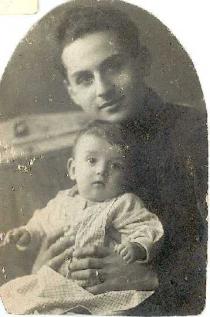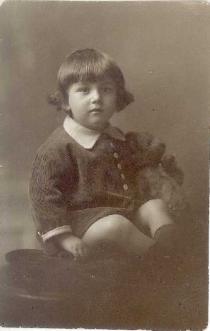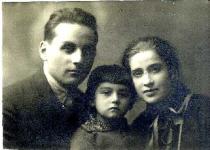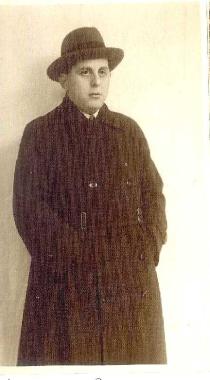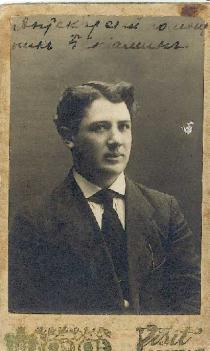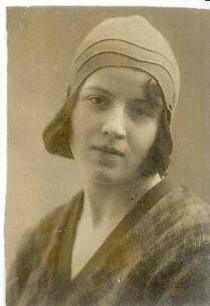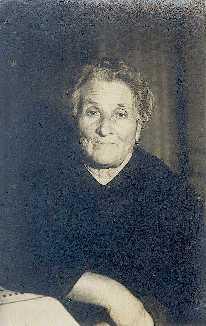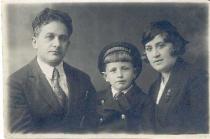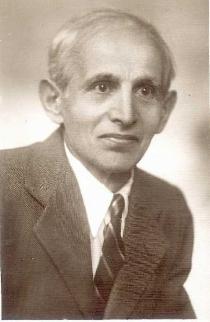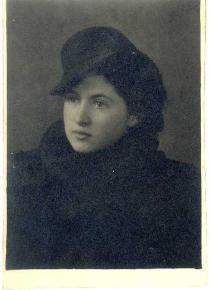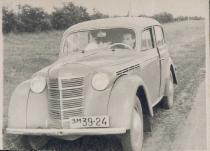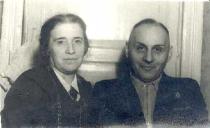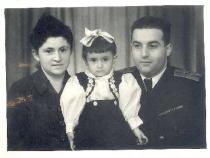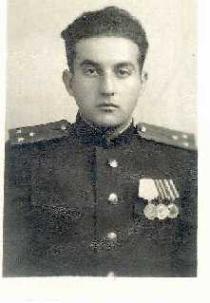This photo was taken in Vitebsk in 1924, just after I was born. Here you can see myself David Levin together with my father Zakhar Davidovich.
My father was born in 1896 and died in 1967. Apparently, my father's family lived in Daugavpils, or Dvinsk, which is in Latvia. Father after the [Russian] Revolution, when Latvia and Lithuania became the independent states, didn't see them and knew nothing about them till late 1940s.
Father was the youngest in his family. And when they had to decide what to do, the elder brother, I don't remember his name, said: 'He finished four grades, that's enough'. I don't know what that was: cheder or something different. And he couldn't forgive his elder brother that entire story.
My father served in the Tsar Army during the World War I. Father told me that he happened to get into the gas attack and he was demobilized after that. After the war he found himself in Vitebsk, and they got to know each other with my mother. Perhaps, he came to visit for some occasion.
And around 1920 they got married. I don't know if they proposed father to my mother. Probably, that was a big Jewish wedding. There were plenty of gifts; I even keep some of them. I suppose that those are very expensive things (two china plates with decorations on the animal themes and a big Japanese panel). They gave them those things for the wedding, mother gave them to me and I hope to give them to my daughter.
When father was yet in Vitebsk, the NEP had begun, and he went often to neighborhood areas as a commercial traveler. He worked for the private firm, which made wrappers for sweets. I even saw that album with those wrappers. He traveled with this album and signed the agreements. Probably, that could continue for ages, but then 1928 came [it was officially required to close NEP, and nepmen were arrested and put to jail], his owner happened to be a clever person and closed her business just in time. It seems to me, that he had no more job and left to Leningrad.
Father had a pal, who has got some good position in future. And that viteblyanin advised him to go to Leningrad and promised him a room, if he worked here for a while. When father has got a room, he lived there for couple months and then invited mother to come.
In Leningrad on Moika [embankment of Moika River - one of the rivers in the very center of the city] there was an artel, and he found there a job of machine operator. He was big and left-handed, and there was such a machine, which had to be revolved to the certain direction, and nobody, except him, couldn't afford it. He showed me this place, and I saw the way he worked.
Later he was a driver, worked in the subsidiary department of the Academy of Arts. His head was Gerasimov, and his brother was cinema director, famous Sergey Gerasimov, who came and got paid, even he didn't do anything there.
Then father worked on the factory named after Stalin, near Finland railway station [station, where trains to Finland and some part of Leningrad region depart from]. That was a huge factory, it had his own football team, and today it's called 'Zenith' [the best football team in whole city, in 1984 wan the USSR championship, usually plays in the Premier league]. Father worked in the subsidiary department of the factory for a long while.
I was born in 1924 in Vitebsk, and when I was three or four years old, we moved to Leningrad. When I was born, my parents rented a separate apartment in Vitebsk. They called the owner as a 'shakhmeister'; I don't know why, maybe, this was Yiddish word for 'owner'? We lived just near the Russian Orthodox Church. And I remember that I was going to the kindergarten.
In 1928 father moved from Vitebsk to Leningrad, and in half a year we, I and my mother, followed him. Since that time I consider Leningrad my native city. We lived on the Gogol (today Malaya Morskaya) street. In that shared apartment, in one room, we lived for almost all our life.

